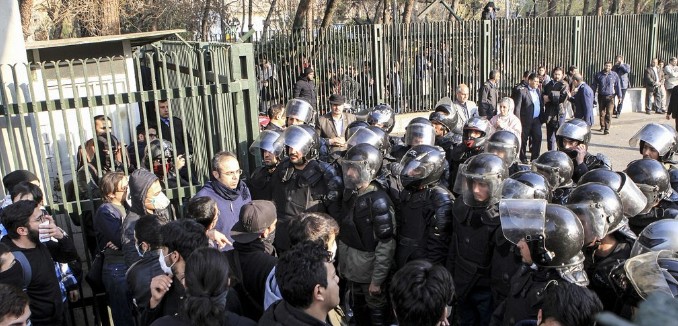When President Barack Obama was interviewed by The Atlantic‘s Jeffrey Goldberg in 2015 about the soon to be agreed on nuclear deal with Iran, Goldberg pressed the president on the wisdom of trusting Iran to act rationally, he responded:
Well the fact that you are anti-Semitic, or racist, doesn’t preclude you from being interested in survival. It doesn’t preclude you from being rational about the need to keep your economy afloat; it doesn’t preclude you from making strategic decisions about how you stay in power; and so the fact that the supreme leader is anti-Semitic doesn’t mean that this overrides all of his other considerations.
In essence, the president was arguing Iranian practices could be called “rational anti-Semitism” and would therefore not risk violating the deal because of the consequences.
Furthermore, when Goldberg asked if Secretary of Treasury Jack Lew’s assessment that more of the sanctions relief would be used to build up Iran’s economy and infrastructure than building up its military and proxies was a bit optimistic, Obama replied:
Then [Iranian President] Rouhani and, by extension, the supreme leader have made a series of commitments to improve the Iranian economy, and the expectations are outsized. You saw the reaction of people in the streets of Tehran after the signing of the agreement. Their expectations are that [the economy is] going to improve significantly. You have Iranian elites who are champing at the bit to start moving business and getting out from under the restraints that they’ve been under.
So not only was Obama arguing that Iran’s declared anti-Semitic intention was “rational,” which would ensure that it abided by the nuclear deal, but also that there would be political constraints limiting Iran’s regional aggression. Furthermore, he added that sanctions had, in fact, strengthened Iran’s Islamic Revolutionary Guard Corps (IRGC), the military organization that not only attempts to spread Iran’s revolution abroad but also is behind the regime’s repression at home. Easing sanctions “may actually lessen” the means the IRGC developed to raise money while sanctions were in full force.
The protests against the regime in recent weeks, however, show how wrong Obama was in assessing the behavior of the Iranian regime.
Rather than being rational and spending the freed up billions on civilian infrastructure, Tehran used its windfall to raise a regional Shiite army, propped up Syria’s dictator Assad and sent ballistic missiles to the Houthi rebels in Yemen. The largess Iran provided to its proxies was not lost on the protesters.
Rather than weakening Supreme Leader Ayatollah Ali Khamenei and the IRGC, the nuclear deal strengthened both of them.
The regime says that it has arrested some 3,700 protesters and at least 22 have been reported killed.
It’s pretty clear that, contrary to Obama’s assertions, the nuclear deal has strengthened the hands of those who would put down the protests.
In its pursuit of regional hegemony, Iran has ignored the needs of its citizens at the expense of its grandiose ambitions, including the destruction of Israel. Certainly, from the standpoint of its own people, Khamenei, President Hassan Rouhani, and the rest of the government have irrationally pursued its anti-Semitic goals.
There is, however, one way in which Iran’s post-nuclear deal behavior is rational: it knows what it can get away with in terms of the rest of the world.
In the Goldberg interview, Obama claimed, “we will continue to ratchet up the costs, not simply for their anti-Semitism, but also for whatever expansionist ambitions they may have.”
In fact, the Obama administration did nothing of the sort. We know now that the Obama administration allowed the pace of the slaughter in Syria to increase, stopped the investigation into Hezbollah’s drug smuggling operations, and allowed numerous Iranians connected to the regime’s proliferation efforts to go free.
In August 2015, just after the nuclear deal was agreed to, IRGC-Qods Force Commander Qassem Soleimani, who is under an international travel ban, went to Moscow to enlist Russia’s support in supporting Assad. In the past two years, the Syrian army, backed by Russian planes and Iran-backed Shiite militias, have recaptured much of Syria, killing thousands in the process. Yet at the time, neither the United States nor any of its partners in the nuclear deal took any action against this blatant violation of international law.
Even now, the European Union invited Iranian Foreign Minister Mohammad Javad Zarif for talks and everyone appeared to have a good time, despite the fact that he’s the face of a regime violently putting down dissent.
Iran is rational in this way: if it knows it will pay no significant cost for its aggression, its aggression will continue.
The challenge now is to change that equation and make Iran’s destabilizing behavior too costly for it to continue. The Justice Department’s recently announced team to investigate Hezbollah’s drug trafficking is an important step in the right direction. With the European Union besotted with the idea of doing commerce with the world’s leading state sponsor of terror, the U.S. may just have to stand alone and use its financial clout to bring Iran under control.
[Photo: Twitter]




